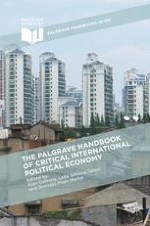2016 | OriginalPaper | Buchkapitel
16. Globalizing China: A Critical Political Economy Perspective on China’s Rise
verfasst von : Henk Overbeek
Erschienen in: The Palgrave Handbook of Critical International Political Economy
Verlag: Palgrave Macmillan UK
Aktivieren Sie unsere intelligente Suche, um passende Fachinhalte oder Patente zu finden.
Wählen Sie Textabschnitte aus um mit Künstlicher Intelligenz passenden Patente zu finden. powered by
Markieren Sie Textabschnitte, um KI-gestützt weitere passende Inhalte zu finden. powered by
